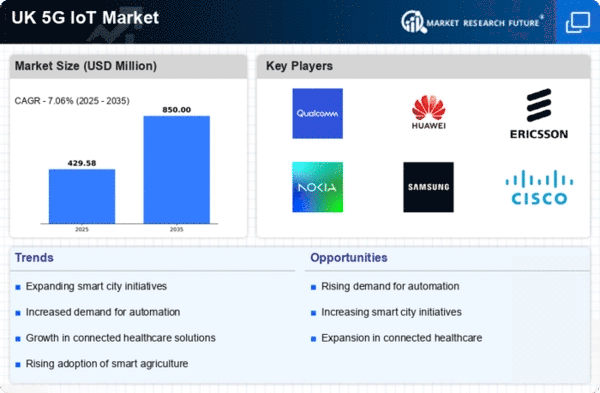Government Initiatives and Support
Government initiatives and support play a crucial role in propelling the 5g iot market in the UK. The UK government has launched various programs aimed at fostering innovation and investment in 5g technologies. For instance, funding schemes and partnerships with private sector players are designed to accelerate the rollout of 5g networks and IoT applications. The UK government has allocated approximately £200 million to support 5g testbeds and trials, which are essential for developing and validating new IoT solutions. Such initiatives not only stimulate market growth but also encourage collaboration between public and private sectors, thereby enhancing the overall ecosystem for IoT development. This supportive environment is likely to attract more investments and drive the adoption of IoT technologies across multiple industries.
Expansion of Network Infrastructure
The expansion of network infrastructure in the UK is a pivotal driver for the 5g iot market. As telecommunications companies invest heavily in enhancing their 5g networks, the availability of high-speed connectivity is expected to increase significantly. This infrastructure development is projected to facilitate the deployment of numerous IoT devices across various sectors, including healthcare, transportation, and smart cities. According to recent estimates, the UK is expected to see a growth in 5g coverage to approximately 80% by 2026, which will likely enhance the operational capabilities of IoT applications. The improved network infrastructure not only supports faster data transmission but also reduces latency, thereby enabling real-time data processing and analytics, which are crucial for the effective functioning of IoT systems.
Emergence of Edge Computing Solutions
The emergence of edge computing solutions is poised to have a profound impact on the 5g iot market in the UK. Edge computing allows data processing to occur closer to the source of data generation, which is particularly beneficial for IoT applications that require low latency and high reliability. By reducing the distance data must travel, edge computing enhances the performance of IoT devices and applications, making them more efficient. This is especially relevant in sectors such as healthcare and autonomous vehicles, where real-time data processing is critical. The UK is witnessing a growing trend towards the adoption of edge computing, with investments in this area expected to reach £1 billion by 2026. This shift is likely to complement the growth of the 5g iot market, as it enables more sophisticated and responsive IoT solutions.
Rising Demand for Smart City Solutions
The rising demand for smart city solutions is significantly influencing the 5g iot market in the UK. Urban areas are increasingly adopting IoT technologies to improve infrastructure, enhance public services, and promote sustainability. The integration of 5g connectivity enables real-time data collection and analysis, which is essential for managing urban resources efficiently. For example, smart traffic management systems can reduce congestion and improve air quality, while smart waste management solutions can optimize collection routes. The UK government has set ambitious targets for smart city initiatives, with investments expected to reach £1.5 billion by 2025. This growing focus on smart city solutions is likely to drive the demand for IoT devices and applications, thereby propelling the growth of the 5g iot market.
Increased Focus on Industrial Automation
The increased focus on industrial automation is emerging as a significant driver for the 5g iot market in the UK. Industries are increasingly leveraging IoT technologies to enhance operational efficiency, reduce costs, and improve productivity. The integration of 5g connectivity allows for seamless communication between machines and systems, enabling real-time monitoring and control of industrial processes. According to industry reports, the adoption of IoT in manufacturing is expected to grow by over 30% in the next few years. This trend is likely to lead to the development of smart factories, where IoT devices can communicate and collaborate autonomously. As industries continue to embrace automation, the demand for 5g-enabled IoT solutions is expected to rise, further driving market growth.
















